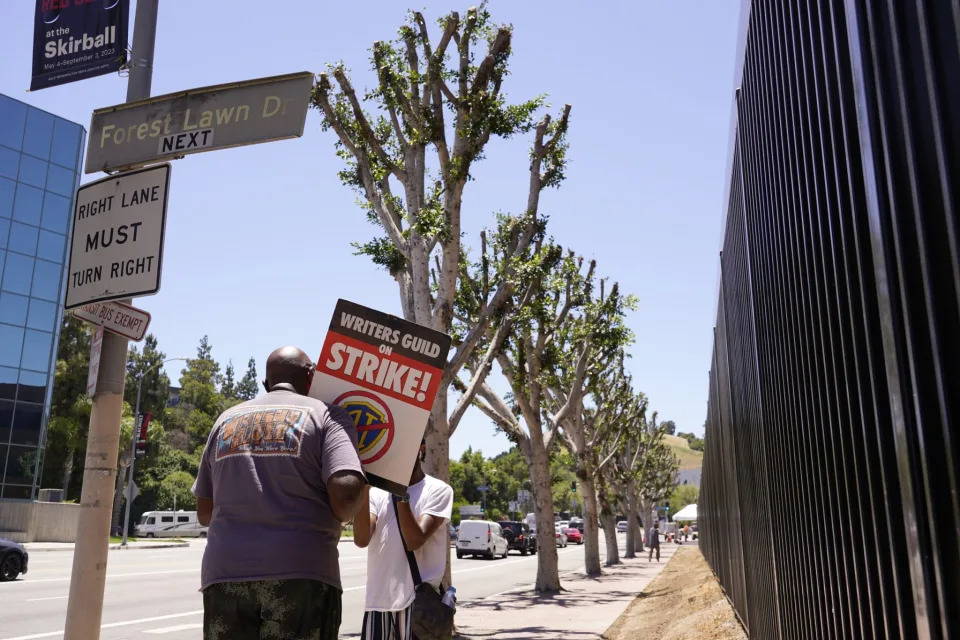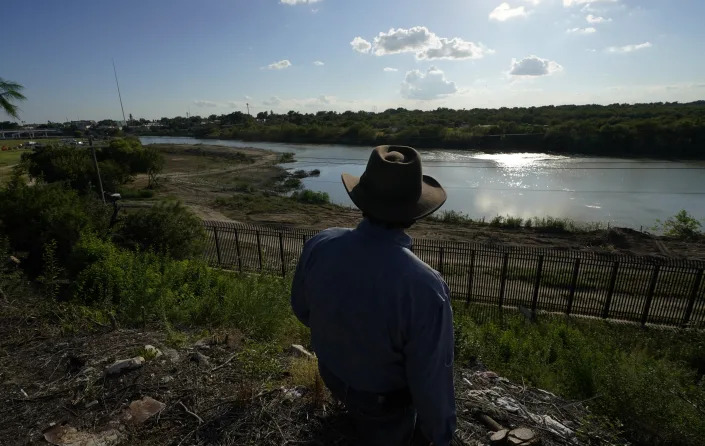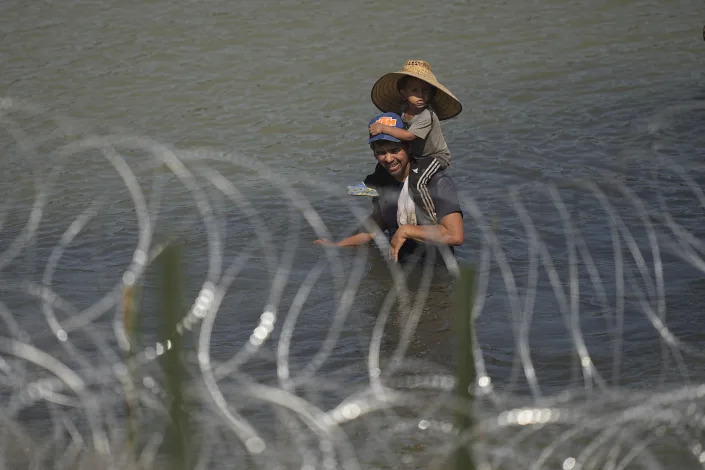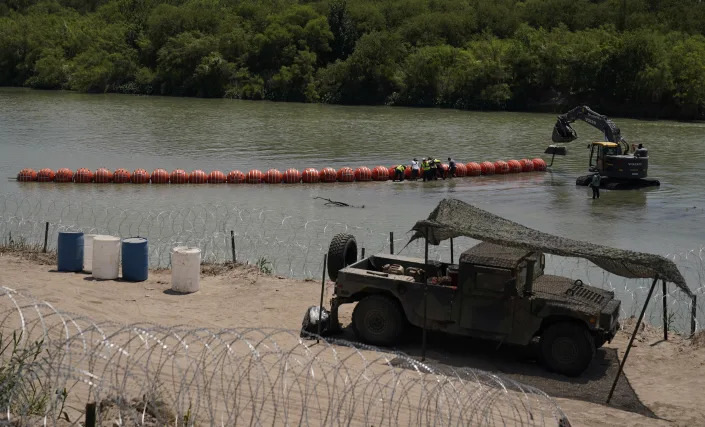Thousands of Nestlé staff at risk of being drafted to fight in Ukraine war
Alexa Phillips
Sun, July 23, 2023

Questions have been raised following rival Unilever’s admission that it would allow Russian staff to be conscripted - ALEXEY PAVLISHAK/REUTERS
More than 7,000 Nestlé workers in Russia are at risk of being conscripted into the Ukraine war as the company comes under pressure to withdraw from the country.
The food giant, which has six factories in Russia, refused to say whether it would intervene to stop staff being called up to fight in Ukraine.
Questions have been raised following rival Unilever’s admission that it would allow Russian staff to be conscripted.
The Swiss business said it is closely monitoring developments in Russia and would “act to safeguard the wellbeing” of its employees and “protect their fundamental rights”.
However, when pressed further, Nestlé declined to say it would take action to stop the conscription of its staff.
Russian law requires any company operating in the country to allow the conscription of workers should they be called upon.
Nestlé and Unilever are among a handful of Western businesses that have remained in Russia following the outbreak of war in Ukraine.
Both have cut back operations in the country and argue that they are providing vital goods to ordinary people who are not involved in the war.
Nestlé said it continues to sell “essential and basic foods”. Products available in Russian supermarkets reportedly include chocolate bars, Nescafé, Purina pet food and Bystrow breakfast cereals.
However, Western businesses are under growing pressure to exit Russia altogether as the war in Ukraine drags on.
Valeriia Voshchevska, of the Ukraine Solidarity Project, a campaign group, said: “Companies basically gamble with the lives of their staff and with their reputation by staying there.
“It’s not like operating in any other country. It’s operating in a country that has basically thrown out any rules and any kind of laws through the window.”
Reginaldo Ecclissato, Unilever’s chief business operations and supply chain officer, has said continuing to run its Russian business with strict constraints was better than selling it with a potential benefit to the Kremlin, or closing down and seeing operations appropriated by the Russian state.
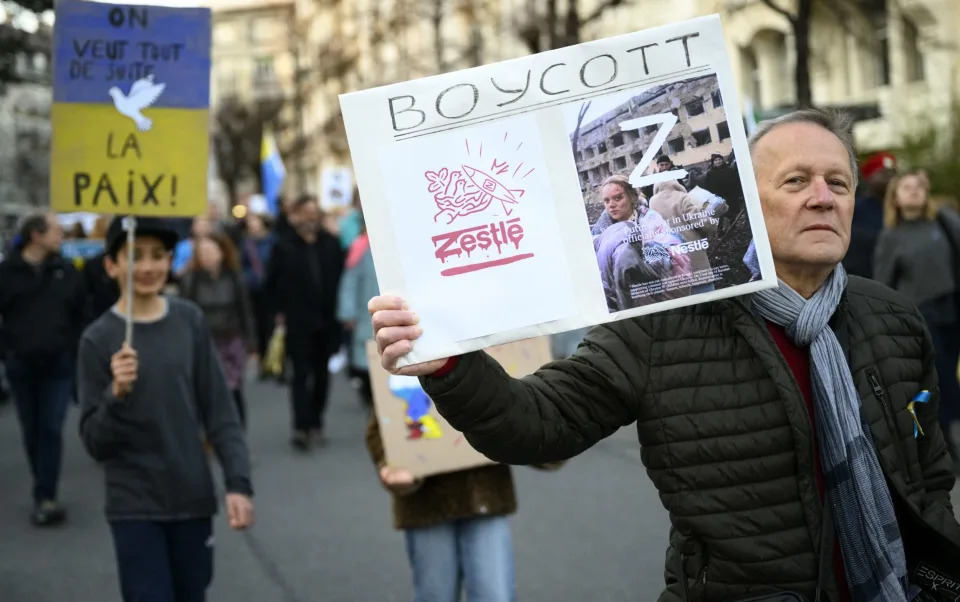
Protesters carry placards 'Boycott Nestle' as they take part in a demonstration against the Russian invasion of Ukraine last year - Shuttershock
Eddy Hargreaves, an equity research analyst at wealth manager Investec, said this defence was starting to become implausible.
Mr Hargreaves said: “Those arguments don’t hold much water now, because it’s not really stopping the Russians doing whatever they want.”
He pointed out that the Russian Government expropriated assets from Carlsberg and Danone last week under a decree aimed at companies from “unfriendly” countries.
Mr Hargreaves said Unilever, Nestlé and other businesses are “being blackmailed into allowing their employees to be conscripted” because if they did not, they would be shut down or have their assets expropriated.
He said: “By staying on it would risk losing more in reputation globally than they might save short term in monetary terms and continuing in Russia.
“At the same time, they can’t really say that they’re safeguarding their employees or their well-being anymore.”
A Nestlé spokesman said: “Since the outbreak of the war in Ukraine, we have implemented the actions we committed to take last year concerning our operations in Russia, and drastically reduced our portfolio in the country to refocus our efforts on continuing to provide access to essential and basic foods for the local people.
“We continue to closely monitor developments in Russia, and act to safeguard the wellbeing of all our employees and to protect their fundamental rights. We have been clear that our employees in Russia should be considered essential workers given the critical nature of our sector: producing food.
“Of course, we are fully complying with all applicable international sanctions on Russia.”
Unilever is not against company's employees being conscripted into Russian army

2
Ukrainska Pravda
Sun, July 23, 2023
The Anglo-Dutch company Unilever, widely represented in the global food products and household chemicals markets, has said that it will comply with Russian legislation on conscription if its Russian employees are conscripted into the army.
Source: BBC
Details: Answering a request from the B4Ukraine group, which is campaigning for companies to stop operating in Russia, Reginaldo Ecclissato, Unilever's Chief Business Operations and Supply Chain Officer, wrote that the company was "aware of the law requiring any company operating in Russia to permit the conscription of employees should they be called. We always comply with all the laws of the countries we operate in," the BBC reported.
Meanwhile, Unilever said it "condemns the war in Ukraine".
"We would like to reiterate that Unilever absolutely condemns the war in Ukraine as a brutal, senseless act by the Russian state and we continue to join the international community in calling for stability and peace in the region," the company's response said.
At the same time, the company stated that it continues to operate in Russia because "exiting is not straightforward" and "to avoid the risk of our business ending up in the hands of the Russian state, either directly or indirectly, and to help protect our people".
In addition, in a letter to B4Ukraine, Unilever reported that it paid 3.8 billion roubles (about $41,769,714) in taxes to the Russian budget in 2022.
For reference. Unilever is one of the world leaders in the food products and household chemicals markets. It owns over 400 brands and manufactures products at 280 factories. These include Domestos, Axe, Rexona, Dove, Calve, Rama, Brooke Bond, Lipton, Crème Bonjour, CIF, Knorr, Sunsilk, Timotei, CLEAR, Chista Liniya and others.
Background: Ukraine’s National Agency on Corruption Prevention (NACP) has added Unilever to its list of international sponsors of war.

2
Ukrainska Pravda
Sun, July 23, 2023
The Anglo-Dutch company Unilever, widely represented in the global food products and household chemicals markets, has said that it will comply with Russian legislation on conscription if its Russian employees are conscripted into the army.
Source: BBC
Details: Answering a request from the B4Ukraine group, which is campaigning for companies to stop operating in Russia, Reginaldo Ecclissato, Unilever's Chief Business Operations and Supply Chain Officer, wrote that the company was "aware of the law requiring any company operating in Russia to permit the conscription of employees should they be called. We always comply with all the laws of the countries we operate in," the BBC reported.
Meanwhile, Unilever said it "condemns the war in Ukraine".
"We would like to reiterate that Unilever absolutely condemns the war in Ukraine as a brutal, senseless act by the Russian state and we continue to join the international community in calling for stability and peace in the region," the company's response said.
At the same time, the company stated that it continues to operate in Russia because "exiting is not straightforward" and "to avoid the risk of our business ending up in the hands of the Russian state, either directly or indirectly, and to help protect our people".
In addition, in a letter to B4Ukraine, Unilever reported that it paid 3.8 billion roubles (about $41,769,714) in taxes to the Russian budget in 2022.
For reference. Unilever is one of the world leaders in the food products and household chemicals markets. It owns over 400 brands and manufactures products at 280 factories. These include Domestos, Axe, Rexona, Dove, Calve, Rama, Brooke Bond, Lipton, Crème Bonjour, CIF, Knorr, Sunsilk, Timotei, CLEAR, Chista Liniya and others.
Background: Ukraine’s National Agency on Corruption Prevention (NACP) has added Unilever to its list of international sponsors of war.
Unilever to allow its 3,000 Russian workers to be conscripted
Hannah Boland
Sat, July 22, 2023
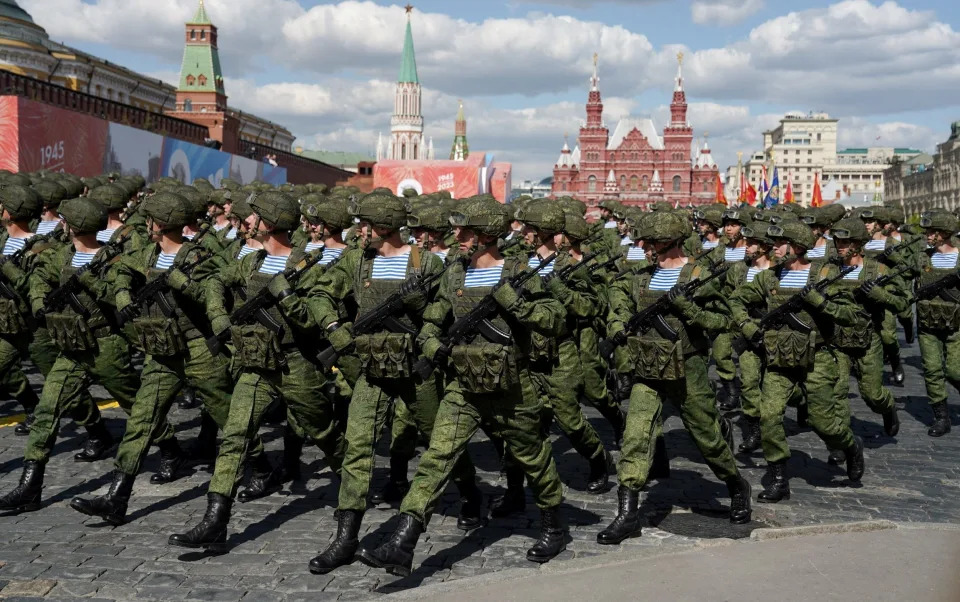
Unilever employees conscripted by the Russian army would not be paid their wages, it is understood - MOSCOW NEWS AGENCY/Reuters
Unilever will allow its thousands of Russian workers to be conscripted into the Ukraine war as the row deepens over its decision to keep selling in the country.
The food giant, which prides itself on its “social purpose”, confirmed it was aware of the Russian law “requiring any company operating in Russia to permit the conscription of employees should they be called”, in a letter to campaign group B4Ukraine.
Reginaldo Ecclissato, Unilever’s chief business operations and supply chain officer, added: “We always comply with all the laws of the countries we operate in.”
It will fuel criticism over Unilever’s decision to keep selling food and hygiene products in Russia, while rivals have exited in response to the war in Ukraine.
The company, which owns Marmite and Dove soap said last year it would review its operations in Russia, but is still selling what it deems is “everyday essential food” in the country, including ice cream.
Unilever was named as a sponsor of war by the Ukrainian government, after continuing to pay taxes in Russia,
Executives from the company have argued “exiting is not straightforward”.
In the letter, issued in response to questions submitted by B4Ukraine, a coalition of more than 80 nonprofits who are urging multinationals to leave Russia, Mr Ecclissato said none of the options it had were “desirable”.
He said there was a risk that by selling the business, the Russian state could potentially “gain further benefit”.
If it closed the business down, Unilever said its business and brands in the country would be “appropriated - and then operated - by the Russian state”.
Mr Ecclissato wrote: “The third option is to allow the business to run with those strict constraints that we put in place last March... We believe the third remains the best option, both to avoid the risk of our business ending up in the hands of the Russian state, either directly or indirectly, and to help protect our people. We will of course continue to keep this position under close review.”
It is understood that if Unilever employees were to be conscripted by the Russian army, their employment contracts would be suspended and wages would not be paid.

Ukraine Solidarity Project named Unilever a ‘sponsor of war’ in a billboard at its London headquarters -
Earlier this month, Unilever was named as a sponsor of war by the Ukrainian government, after continuing to pay taxes in Russia, totalling RUB 3.8bn (£33m) last year.
The accusations were made by the Ukraine Solidarity Project, a group of veterans and international activists, who installed a billboard outside of Unilever’s London headquarters which depicted images of Ukrainian soldiers in the style of the company’s Dove adverts.
Valeriia Voshchevska, of the Ukraine Solidarity Project, described Unilever’s stance as “jaw-dropping”.
She said: “When people see Unilever products in the shops – like Hellman’s Mayonnaise, Marmite, Magnum and Dove – they now know that this company is prepared to conscript thousands of its workers for Russia’s war effort. It’s hard to get your head around.
“Unilever’s out of excuses. It needs to do the right thing and stop doing business in Russia now.”
Unilever has historically been known for positioning itself as a “social purpose” company, with its Ben & Jerry’s brand in particular adopting hardline stances on social issues and geopolitics. Last year, the ice cream brand criticised Joe Biden for “fanning the flames of war” in Ukraine.
On Twitter, Ben & Jerry’s said: “You cannot simultaneously prevent and prepare for war.
“We call on President Biden to de-escalate tensions and work for peace rather than prepare for war.
“Sending thousands more US troops to Europe in response to Russia’s threats against Ukraine only fans the flame of war.”
Hannah Boland
Sat, July 22, 2023

Unilever employees conscripted by the Russian army would not be paid their wages, it is understood - MOSCOW NEWS AGENCY/Reuters
Unilever will allow its thousands of Russian workers to be conscripted into the Ukraine war as the row deepens over its decision to keep selling in the country.
The food giant, which prides itself on its “social purpose”, confirmed it was aware of the Russian law “requiring any company operating in Russia to permit the conscription of employees should they be called”, in a letter to campaign group B4Ukraine.
Reginaldo Ecclissato, Unilever’s chief business operations and supply chain officer, added: “We always comply with all the laws of the countries we operate in.”
It will fuel criticism over Unilever’s decision to keep selling food and hygiene products in Russia, while rivals have exited in response to the war in Ukraine.
The company, which owns Marmite and Dove soap said last year it would review its operations in Russia, but is still selling what it deems is “everyday essential food” in the country, including ice cream.
Unilever was named as a sponsor of war by the Ukrainian government, after continuing to pay taxes in Russia,
Executives from the company have argued “exiting is not straightforward”.
In the letter, issued in response to questions submitted by B4Ukraine, a coalition of more than 80 nonprofits who are urging multinationals to leave Russia, Mr Ecclissato said none of the options it had were “desirable”.
He said there was a risk that by selling the business, the Russian state could potentially “gain further benefit”.
If it closed the business down, Unilever said its business and brands in the country would be “appropriated - and then operated - by the Russian state”.
Mr Ecclissato wrote: “The third option is to allow the business to run with those strict constraints that we put in place last March... We believe the third remains the best option, both to avoid the risk of our business ending up in the hands of the Russian state, either directly or indirectly, and to help protect our people. We will of course continue to keep this position under close review.”
It is understood that if Unilever employees were to be conscripted by the Russian army, their employment contracts would be suspended and wages would not be paid.

Ukraine Solidarity Project named Unilever a ‘sponsor of war’ in a billboard at its London headquarters -
Earlier this month, Unilever was named as a sponsor of war by the Ukrainian government, after continuing to pay taxes in Russia, totalling RUB 3.8bn (£33m) last year.
The accusations were made by the Ukraine Solidarity Project, a group of veterans and international activists, who installed a billboard outside of Unilever’s London headquarters which depicted images of Ukrainian soldiers in the style of the company’s Dove adverts.
Valeriia Voshchevska, of the Ukraine Solidarity Project, described Unilever’s stance as “jaw-dropping”.
She said: “When people see Unilever products in the shops – like Hellman’s Mayonnaise, Marmite, Magnum and Dove – they now know that this company is prepared to conscript thousands of its workers for Russia’s war effort. It’s hard to get your head around.
“Unilever’s out of excuses. It needs to do the right thing and stop doing business in Russia now.”
Unilever has historically been known for positioning itself as a “social purpose” company, with its Ben & Jerry’s brand in particular adopting hardline stances on social issues and geopolitics. Last year, the ice cream brand criticised Joe Biden for “fanning the flames of war” in Ukraine.
On Twitter, Ben & Jerry’s said: “You cannot simultaneously prevent and prepare for war.
“We call on President Biden to de-escalate tensions and work for peace rather than prepare for war.
“Sending thousands more US troops to Europe in response to Russia’s threats against Ukraine only fans the flame of war.”


